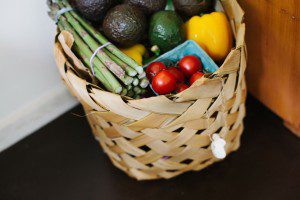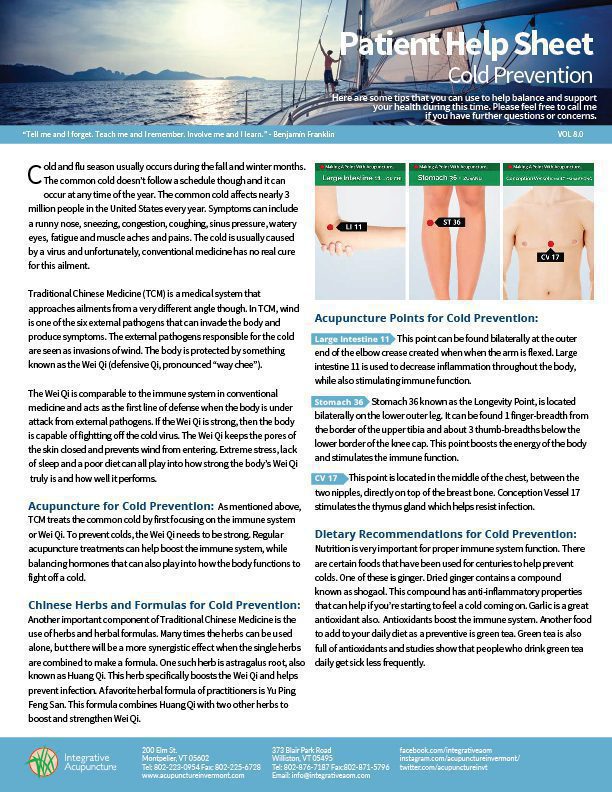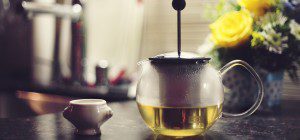How One Acupuncturist Beats Cold and Flu Season
By Jacqueline Gabardy
It’s the season for getting sick. And it seems to be hitting everyone but me.
Friends, family, and most of my patients are complaining of symptoms, from colds and stomach flus to fevers and sinus infections. Although I interact with many sick people this time of year, I don’t get sick myself.
I can’t thank the flu shot—I’ve never had one. Multivitamins nor antibacterial gels are keeping me healthy—I don’t use either of these things.
My trick to surviving cold and flu season unscathed is actually much simpler. I use tried-and-true methods that have worked for generations.
Here are eight of my go-to routines for staying healthy throughout cold and flu season.
Bone broth
People have been consuming bone broth to stay healthy for countless generations. It has so many benefits that I think nearly everyone should be drinking it regularly.
At least once or twice a week, I make a big pot of bone broth and drink it almost every day. I usually have 1-2 cups in the morning plus whatever else I can squeeze into lunch and dinner. I use it for soup, sauces, and for braising veggies—bone broth is especially good for simmering with collard greens or kale.
The immune-building properties of bone broth are well known. I believe my regular consumption is a huge contributor to the strength of my immune system. If you’re already sick, bone broth also is great for recovery.
Here’s how to make your own bone broth.
Herbal tea
During fall and winter, I drink herbal teas all day long. Even when it isn’t a cold winter, like here in LA, I still prefer warm beverages.
I like to start the morning with ginger tea because it stimulates my digestion, is an immune tonic, and warms me up. I often make it fresh from ginger I get at the farmers’ market, but I also have the Yogi tea version for when I’m in a pinch. I love ginger so much that I often continue drinking it throughout the rest of the day. I’ll also toss in the occasional spiced chai, chamomile, fresh mint, gynostemma, raspberry leaf, licorice, or other herbal blends.
Gynostemma is especially good for immunity and is packed with antioxidants. It is believed to promote longevity and has been proven to have a number of other benefits like reducing cholesterol, lowering blood pressure, and balancing blood sugar. It is one of the most popular teas in Asia and is often consumed daily.
Socks and scarves
What your mother told you is true! It’s important to keep your neck and feet covered and warm during cold and flu season.
From an acupuncture perspective, this age-old advice comes down to one thing: Wind.
In Chinese medicine, Wind is the cause of 10,000 diseases—and common colds are just the tip of the iceberg. Depending on how deep Wind has penetrated the body, it can cause allergies, arthritis, stiff neck, headaches, body aches, asthma, skin rashes, hives, dizziness, and more.
With a common cold, the body’s defenses (the immune system) are low. Wind finds a way in through vulnerable spots like the back of the neck, which is known as the “Wind gate” in Chinese medicine.
This time of year especially, don’t leave home without a scarf. And ditch the flip flops!
Exercise
Beyond weight loss, exercise helps to circulate blood, speed up metabolism, strengthen immunity, detoxify the body, and improve mental health. I also have seen it help many forms of chronic pain.
Even if you are limited by an injury, energy level or time, finding some form of regular exercise is paramount to staying healthy all year long. This time of year, especially in colder climates, there is a temptation to spend more time on the couch and less time outside moving around. But exercise almost always pays off.
If you aren’t in the habit of working out regularly, start with walking. You can do this nearly any time of day, almost anywhere, and you can bring a friend or interesting podcast along to help distract you. Start to add in other activities at your own pace, things like hiking, quick 15-minutes runs, yoga, light weight training, a dance class, or whatever works for you.
Real food
 I mentioned above that I don’t take a multivitamin (more on that here). I get all the vitamins I need from the food I eat.
I mentioned above that I don’t take a multivitamin (more on that here). I get all the vitamins I need from the food I eat.
I try to get most of my produce, meat, and dairy from local sources, which means visiting the farmers’ market 1-3 times per week. This can be a little less convenient than going to the nearby grocery store, but it’s worth it. Lower transit time from farm to table means more nutrients retained and fresher food that keeps longer in the fridge.
I focus on nutrient-dense foods like grass-fed meat and dairy, organ meats, local bee products, bone broth, and organic seasonal produce. I only supplement my diet with a few whole foods that I can’t get locally, like fermented cod liver oil and blue-green micro-algae. This gives my immune system all the nutrients it needs to stay strong.
If you are curious about eating a real-food diet, I suggest Real Food: What to Eat and Why by Nina Planck. For those who still want to take something like a multivitamin, I suggest Juice Plus, which is a real-food supplement made from organic fruits and vegetables.
Sleep
 Sleep is important all year long, but especially in the wintertime.
Sleep is important all year long, but especially in the wintertime.
Winter is like the nighttime of the whole year because it is colder, darker, and more quiet than the rest of the year. Just as our bodies rest and reset for the next day at night, winter is when our bodies need to rest for the busy warmer months ahead.
In Chinese medicine, too little sleep can be linked to anxiety, poor immunity, hormonal imbalances, stress, and low energy. Ideally adults should be getting at least 7-8 hours per night. If you’re missing out on a full night sleep, try taking naps, getting to bed earlier, and just generally slowing down a bit.
If you have trouble sleeping, it is important to still use nighttime to rest. Your body needs that dark, still, quiet time in order to balance out all the energy you use during the day.
Start by putting away your phone and computer at night and avoiding the TV. Screens are stimulating and can trick the brain into thinking it’s time to be awake. Turn down the lights, climb into bed, and do something that relaxes you like light stretching, meditating, listening to soothing music, or reading. Eventually, even if you still can’t sleep, turn all the lights out, lie down, and rest.
Your body will ultimately find a way to rest, but it may have to get sick or extremely fatigued in order for that to happen.
For more self-care tips for insomnia, read this article.
Probiotics
These are the “good” bacteria that live in our gut. They are essential to digestion and also play a huge roll in immunity. They are one of our first lines of defense and compete with harmful bacteria that may invade the body.
Probiotics occur naturally in fermented or cultured foods, so I regularly consume kombucha, raw apple cider vinegar, sour pickles, sauerkraut, kimchi, kefir, and yogurt.
For those who aren’t as fond of fermented foods, I recommend Jarrow’s Jarro-Dophilus because they don’t require refrigeration. They provide a big boost of live strains and I’ve never seen anyone have a side effect from taking proper amounts of good-quality probiotics.
Especially after an illness or taking antibiotics, it is important to build your gut flora back up by getting an extra boost of probiotics.
De-stress therapies
Stress can negatively impact so many aspects of our lives, so it is no surprise that it’s been proven to weaken the immune system. Cold and flu season is an especially important time to make sure we aren’t letting stress get to us. As I mentioned regarding sleep, our bodies need quiet and calm times to balance out the more stressful and hectic hours in the day.
I use a combination of meditation, massage, acupuncture, and gardening to stay relaxed. If you find yourself feeling frantic, focus on activities that slow you down. Incorporate them into your schedule on an ongoing basis and find a routine that works for you.
Guest Post From: Jacqueline Gabardy is an acupuncturist, herbalist, and blogger living in Los Angeles, California. She started the website Sweet Beet and Green Bean to share her obsession with real food. She is a cheerleader for traditional diets and holistic lifestyles, but also believes that sometimes a piece of cake can be good for the soul.











